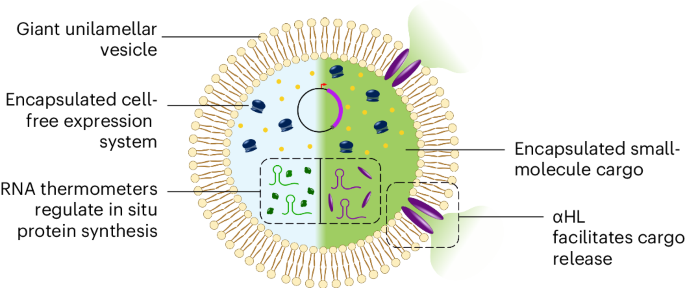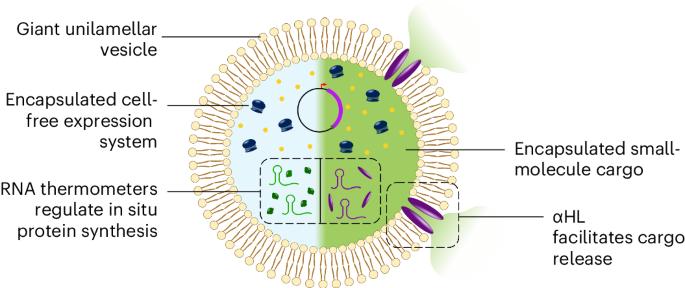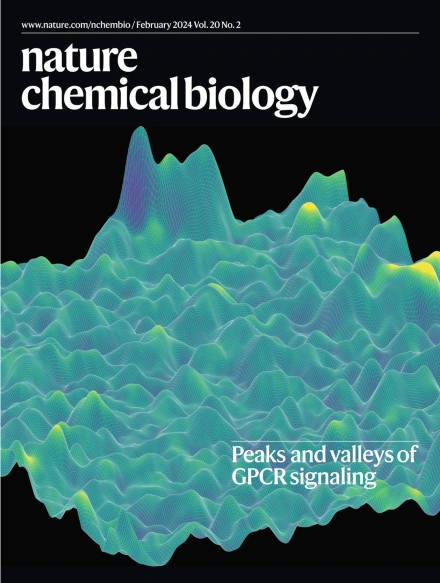Genetically programmed synthetic cells for thermo-responsive protein synthesis and cargo release
IF 12.9
1区 生物学
Q1 BIOCHEMISTRY & MOLECULAR BIOLOGY
引用次数: 0
Abstract
Synthetic cells containing genetic programs and protein expression machinery are increasingly recognized as powerful counterparts to engineered living cells in the context of biotechnology, therapeutics and cellular modelling. So far, genetic regulation of synthetic cell activity has been largely confined to chemical stimuli; to unlock their potential in applied settings, engineering stimuli-responsive synthetic cells under genetic regulation is imperative. Here we report the development of temperature-sensitive synthetic cells that control protein production by exploiting heat-responsive mRNA elements. This is achieved by combining RNA thermometer technology, cell-free protein expression and vesicle-based synthetic cell design to create cell-sized capsules able to initiate synthesis of both soluble proteins and membrane proteins at defined temperatures. We show that the latter allows for temperature-controlled cargo release phenomena with potential implications for biomedicine. Platforms like the one presented here can pave the way for customizable, genetically programmed synthetic cells under thermal control to be used in biotechnology. RNA-based genetic regulation has been used to control protein translation in synthetic cells in response to the external temperature. RNA thermometers enable in situ protein expression above permissive temperatures. Controlled expression of the membrane pore α-hemolysin allows small-molecule cargo to be released in a temperature-dependent manner.


用于热响应蛋白质合成和货物释放的基因编程合成细胞。
在生物技术、治疗和细胞建模领域,含有遗传程序和蛋白质表达机制的合成细胞越来越被认为是工程活细胞的强大对应物。迄今为止,对合成细胞活动的基因调控主要局限于化学刺激;要在应用环境中释放其潜力,必须在基因调控下设计刺激响应型合成细胞。在这里,我们报告了利用热响应 mRNA 元件控制蛋白质生产的温度敏感合成细胞的开发情况。这是通过将 RNA 温度计技术、无细胞蛋白质表达和基于囊泡的合成细胞设计相结合来实现的,从而创造出细胞大小的囊泡,能够在规定温度下启动可溶性蛋白质和膜蛋白质的合成。我们的研究表明,后者可实现温控货物释放现象,对生物医学具有潜在影响。像本文介绍的平台可以为生物技术中使用的可定制、热控制下的基因编程合成细胞铺平道路。
本文章由计算机程序翻译,如有差异,请以英文原文为准。
求助全文
约1分钟内获得全文
求助全文
来源期刊

Nature chemical biology
生物-生化与分子生物学
CiteScore
23.90
自引率
1.40%
发文量
238
审稿时长
12 months
期刊介绍:
Nature Chemical Biology stands as an esteemed international monthly journal, offering a prominent platform for the chemical biology community to showcase top-tier original research and commentary. Operating at the crossroads of chemistry, biology, and related disciplines, chemical biology utilizes scientific ideas and approaches to comprehend and manipulate biological systems with molecular precision.
The journal embraces contributions from the growing community of chemical biologists, encompassing insights from chemists applying principles and tools to biological inquiries and biologists striving to comprehend and control molecular-level biological processes. We prioritize studies unveiling significant conceptual or practical advancements in areas where chemistry and biology intersect, emphasizing basic research, especially those reporting novel chemical or biological tools and offering profound molecular-level insights into underlying biological mechanisms.
Nature Chemical Biology also welcomes manuscripts describing applied molecular studies at the chemistry-biology interface due to the broad utility of chemical biology approaches in manipulating or engineering biological systems. Irrespective of scientific focus, we actively seek submissions that creatively blend chemistry and biology, particularly those providing substantial conceptual or methodological breakthroughs with the potential to open innovative research avenues. The journal maintains a robust and impartial review process, emphasizing thorough chemical and biological characterization.
 求助内容:
求助内容: 应助结果提醒方式:
应助结果提醒方式:


